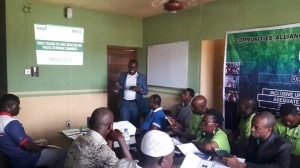27 leaders of informal communities participated in the one-day capacity-building workshop which the Communities Alliance against Displacement (CAD) organized for its executives and leaders of their member-communities on March 30, 2018, in Lagos. CAD is a loose network that brings together representatives of informal communities and interest groups in Lagos committed to undertaking individual and collective action against forced displacement. Since it was formed in March 2017, CAD has launched series of campaigns demanding access to basic amenities and improvement in the housing/living conditions in their various member-communities.
The first session of the workshop, facilitated by SPACES FOR CHANGE, focused on advocacy and non-legal strategies for demanding improvements in access to amenities and support services in informal communities. Some of the outlined strategies include open letters, budget tracking, public petitions to government officials and agencies, town hall meetings, policy dialogues, lobbying, interventions by traditional institutions and non-governmental organizations, among others. Regardless of the strategy communities chose to adopt, emphasis must be placed on inclusive organizing and mobilization, ensuring that the interested of all groups are represented and articulated: elders, youth, men, women, children and traditional leaders.
It is instructive to note that the effectiveness of community advocacy and non-legal strategies rests on the pillars of mass mobilization and joint action. For instance, high toll gate tariffs were revised after an intense campaign by Lekki residents. Jolted by the recent massive flooding caused by torrential rains, residents of Lekki, Victoria Island and Ikoyi also formed a coalition to pressure the government to enforce compliance with its drainage master plan, among others. Letter writing, public petitions and media campaigns were among the strategies the Lekki Residents’ Association used to achieve results These two examples show how group action can generate the kind of pressure needed to make draw government’s attention to pressing infrastructure gaps in a locality.
As 2018 election fever heats up, this is a good time for community leaders to negotiate development blueprints and action plans with political aspirants. This is also the time to shop for political actors that can work for the betterment of their communities rather than voting merely based on ethnic or political party affiliations. For instance, communities can commit to vote en masse for candidates who agree to a no-demolition policy or candidates that commit to look into the needs of informal settlements. SPACES FOR CHANGE encouraged members and leaders of CAD to be more active and highly-networked in electoral politics. CAD stands a greater chance of influencing public policies if their members gets into any elective position at the local or state level. Conversations were also held around the collection of PVCs for the next election, and the imperative of registering to vote. Community leaders were urged to use issues that affect them bargaining tools with politicians and contestants.
The Community Life Project/ Reclaim Naija facilitated the second session of the workshop focusing on Community Participation in Community Development. CLP shared experience of a project in Ekiti State where the organization trained the local government authorities and community leaders on how to execute community projects in a participatory way. Strategies adopted in the project that ensured its overall success include the use of direct labor, use of communal lands and division of labour among community stakeholders, including men and women. The Ekiti success story not only showed how community participation in governance can change the quality of engagement at various levels, but also reaffirms the popular refrain that power resides in the hands of the people. Again, CAD members were urged to participate in the electoral processes at the community level and also push for effective representation.
BudgIT facilitated the third session, Budget Tracking for Public Infrastructure Projects in Informal Communities. BudgIT is a civic organisation that uses simplified technology and infographics to explain budgets to citizens. This session enlightened participants on the importance of budget tracking and how to effectively track and monitor constituency projects of federal lawmakers within their localities. The essence of this was to help CAD executives track government projects and ensure implementation of these projects to ensure accountability and delivery of public goods.
BudgIT has developed a tool, called Tracka, for tracking development projects in Nigeria. Tracka as a tool creates access to data for active citizens interested in following the budgetary provisions in their communities. Tracka is primarily built to widen citizen knowledge about budget priorities and empower Nigerians to collaborate for efficient service delivery. Within Tracka, budget line items are simplified and developed into interactive applications, visuals, and infographics – to enhance citizens’ understanding, and shared, using social media tools to enhance debate centered on national and sub-national budgets. CAD executives and members were intimated of the different levels of success of the Tracka project, through which the project is being tracked and how they have been able to hold lawmakers accountable in different states where it is active. ‘Beyond creating access to budgetary provisions to Citizens with Internet access, Tracka holds offline, town hall meetings to engage the grassroots, utilizing cell groups’ formation to sensitize communities about the specific budget line items that warrant public scrutiny to ensure optimal responses from government’, the BudgIT executive explained.
An interactive session held at the end of three presentations allowed participants to ask questions and share experiences regarding the different strategies their community leaders were already using to push for better access to urban services, for adequate representation, and for reforms in the housing and urban sectors. They also discussed ways in which the community leaders can be carried along in the formulation of housing, land and social policies that concern them. The participants resolved to increase their attendance, contribution and participation in town hall meetings.





















